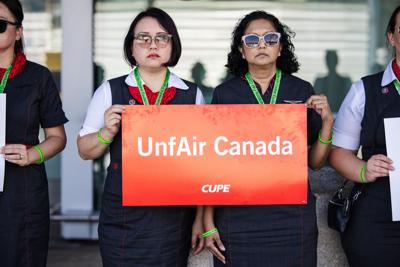Air Canada says it has “reached an impasse” in negotiations with its flight attendants as the parties approached the midnight threshold to potentially issue either a strike notice or a lockout.
The notification came after the union representing more than 10,000 Air Canada flight attendants╠²had rejected the airline’s proposal to move contract negotiations to arbitration.
The two parties have not come close to an agreement on wages.╠²
Negotiations have been ongoing since the beginning of the year, as their last 10-year contract expired in March.
Aug. 16 is the earliest date that flight attendants represented by the Air Canada component of the Canadian Union of Public Employees (CUPE) would be in a legal strike position.
They can serve a 72-hour strike notice at any time, but would need to do╠²so╠²before╠²midnight╠²if╠²they intend to walk off the job at 12:01 a.m. on Saturday.╠²At the same time, Air Canada could also issue a lockout notice that would go into effect on Saturday.
“Air Canada is now looking at all remaining options, including a request for government-directed arbitration, to prevent a disruption or at least remove this intolerable uncertainty for our customers,” said Arielle Meloul-Wechsler, executive vice president, at Air Canada.
Wesley Lesosky, President of CUPE, said in a press release that Air Canada’s latest offer is “below inflation, below market value, below minimum wage, and still leaves flight attendants unpaid for all hours of work.”
Air Canada considers 75 hours a month as full-time work and currently pays a starting rate of $26 an hour, which amounts to $1,925 a month.
By their fourth year on the job, the rate would increase to $42.99 an hour. On average, flight attendants fly about 80 hours a month, the union told the Star.
Lesosky said that Air Canada has offered an eight per cent raise in the first year, but this is overshadowed by a nine per cent cut in real wages due to inflation.
Even after the increase, junior Air Canada flight attendantsŌĆÖ wages would reach╠²$2,108.60 a month for 75-hour flights ŌĆö still below federal minimum wage.
The airline’s offer of a 17.2 per cent wage increase over four years is not competitive within the industry, he added. Additionally, Lesosky said Air Canada would begin to compensate only some of the attendants’ safety-related duties, and then at just 50 per cent of their hourly rate.
Air Canada said in its announcement,╠²it has offered 38 per cent in total compensation over four years, including pensions, benefits and ground pay.╠²
The airline issued a letter to the union on Monday that stated╠²it now proposes using ‘interest arbitration’ to ŌĆ£move forward without further delay and uncertainty,ŌĆØ given that the two sides have been unable to reach a tentative agreement after eight months of bargaining.
CUPE has turned down the proposal, saying Air Canada flight attendants want to end the practice of not being paid for time spent on the ground, while the airline wants an arbitrator ŌĆö who relies on precedent ŌĆö to ŌĆ£do their dirty work for them to keep the status quo intact.ŌĆØ
“Air Canada and Air Canada Rouge have decided they no longer want to negotiate,” and have issued a letter urging the union to agree to arbitration rather than bargaining, the union said, adding that the airline wants to go to arbitration to take away members’ democratic voice at the bargaining table.
Steven Tufts, an associate professor of labour at York University, told the Star he is not surprised by the unionŌĆÖs move, agreeing that compensation for unpaid time is unlikely to be resolved in arbitration, which tends to tweak agreements rather than make radical changes.
ŌĆ£ItŌĆÖs a bit insulting that Air Canada would put this out there,ŌĆØ he said, adding that it signals the airlineŌĆÖs intention to delay bargaining on this important issue.
Tufts said that, lacking real-time bargaining details, he could not speculate on when the union might issue a strike notice.
However, he said it would be difficult for the union to ŌĆ£win anything significantŌĆØ on the unpaid time issue without a strike, as it is unprecedented in Canada and would require restructuring the compensation system.
York University╠²labour law professor╠²David Doorey╠²said, ŌĆ£if negotiations are stalled, I would expect a notice to strike or even to lock out workers could be given fairly soon in order to raise the stakes of not reaching a deal.ŌĆØ
The party most interested in avoiding an arbitration outcome has the greatest incentive to reach an agreement, he explained.
Tufts said Air Canada is awaiting to see whether Prime Minister Mark Carney will signal that he will legislate flight attendants back to work if a strike occurs, a move often followed by binding arbitration likely to rule in Air CanadaŌĆÖs favour.
Justin TrudeauŌĆÖs government did not intervene in Air CanadaŌĆÖs bargaining with its pilots last year, and the question remains whether Carney would do the same, Tufts said.
Trudeau was courting the unionŌĆÖs vote, but Carney is “not facing an election right now,” ╠²Tufts added. “HeŌĆÖs also moved the Liberal party to the right, and weŌĆÖre dealing with a union thatŌĆÖs primarily women, not primarily men.ŌĆØ
Air Canada says it remains available to negotiate with the union, but the time is running short, saying “the╠²situation is exacerbated by the fact that CUPE refused to negotiate for ten precious days while it sought a strike mandate.”
In the event of flight disruptions, Air Canada says its╠²flights operated by Jazz or PAL Airlines will continue to operate as normal, as their services are provided by third-party companies. But they only carry about 20 per cent of Air CanadaŌĆÖs daily customers.





























To join the conversation set a first and last name in your user profile.
Sign in or register for free to join the Conversation